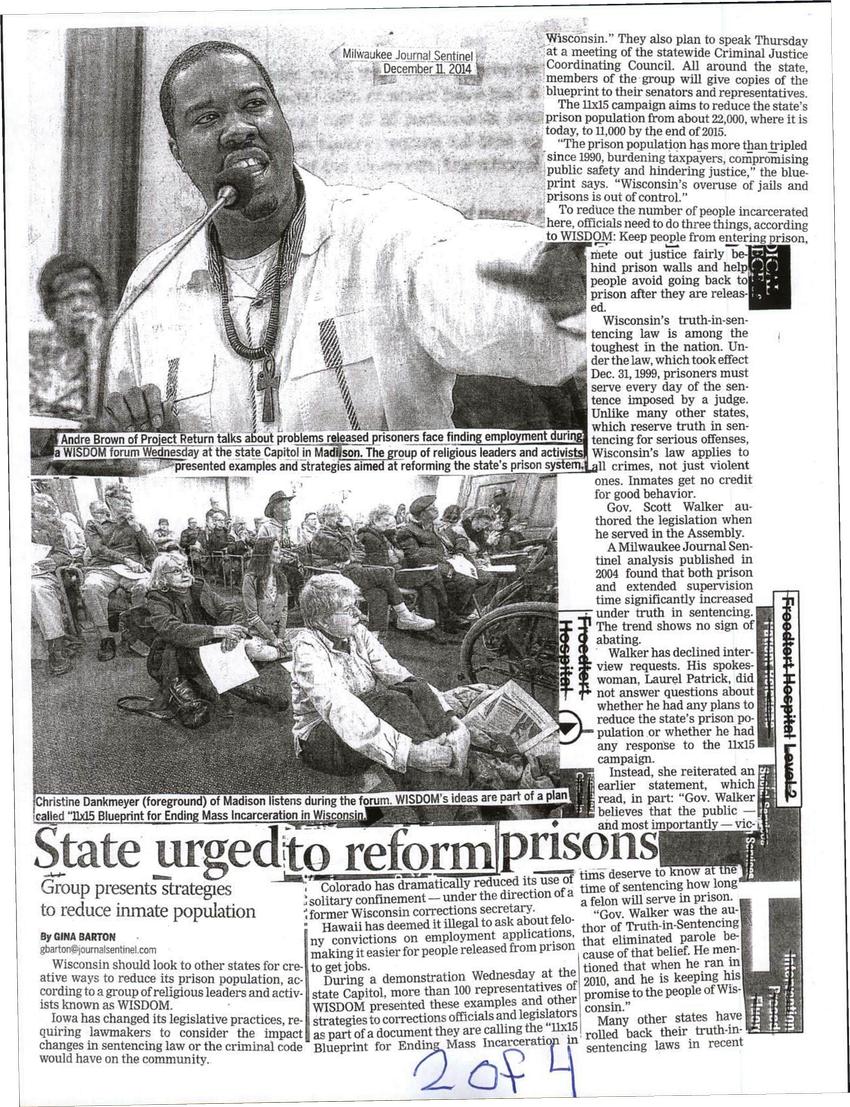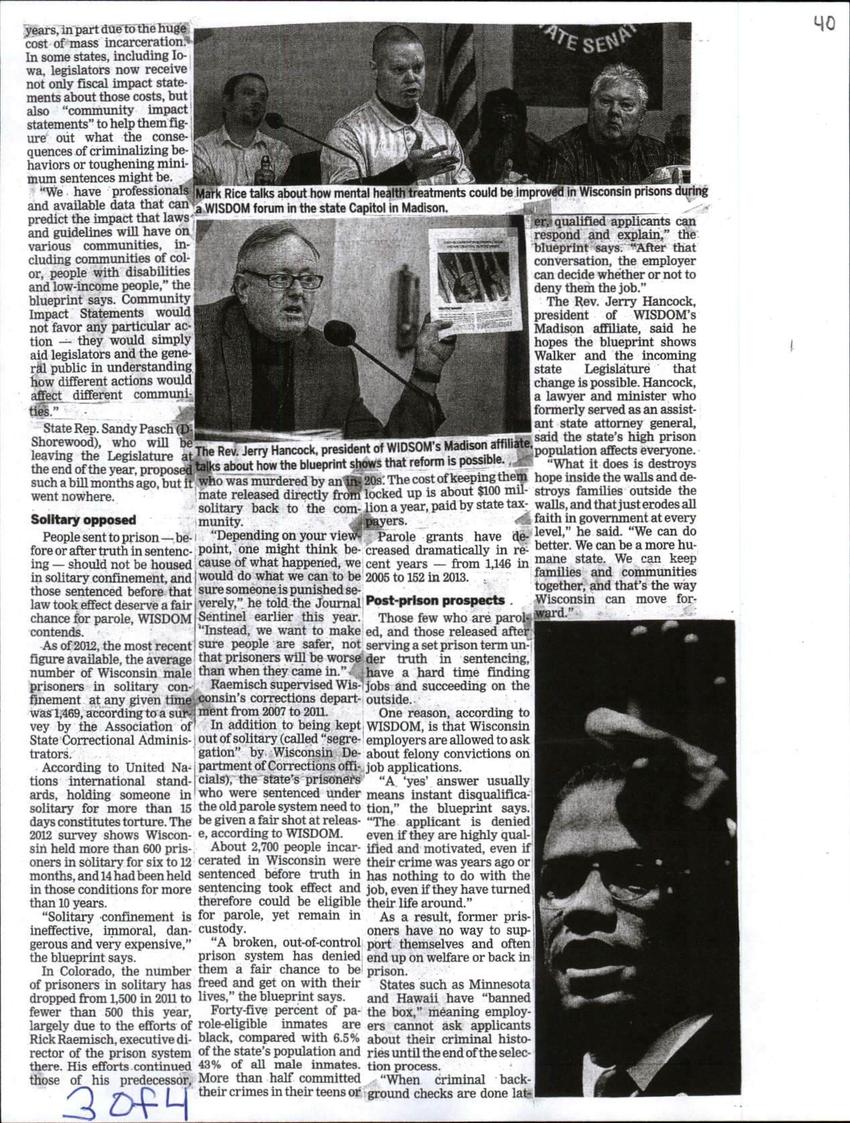
Transcription
http://archive.jsonline.com/news/crime/group-urges-wisconsin-to-look-at-other-states-prison-reforms-b99404296z1-285371231.html/
State urged to reform prisons
Group presents strategies to reduce inmate population
By Gina Barton of the Journal Sentinel
gbarton@journalsentinel.com
Milwaukee Journal Sentinel
Dec. 10, 2014
Wisconsin should look to other states for creative ways to reduce its prison population, according to a group of religious leaders and activists known as WISDOM.
Iowa has changed its legislative practices, requiring lawmakers to consider the impact changes in sentencing law or the criminal code would have on the community.
Colorado has dramatically reduced its use of solitary confinement — under the direction of a former Wisconsin corrections secretary.
Hawaii has deemed it illegal to ask about felony convictions on employment applications, making it easier for people released from prison to get jobs.
During a demonstration Wednesday at the state Capitol, more than 100 representatives of WISDOM presented these examples and other strategies to corrections officials and legislators as part of a document they are calling the "11x15 Blueprint for Ending Mass Incarceration in Wisconsin." They also plan to speak Thursday at a meeting of the statewide Criminal Justice Coordinating Council. All around the state, members of the group will give copies of the blueprint to their senators and representatives.
The 11x15 campaign aims to reduce the state's prison population from about 22,000, where it is today, to 11,000 by the end of 2015.
"The prison population has more than tripled since 1990, burdening taxpayers, compromising public safety and hindering justice," the blueprint says. "Wisconsin's overuse of jails and prisons is out of control."
To reduce the number of people incarcerated here, officials need to do three things, according to WISDOM: Keep people from entering prison, mete out justice fairly behind prison walls and help people avoid going back to prison after they are released.
Wisconsin's truth-in-sentencing law is among the toughest in the nation. Under the law, which took effect Dec. 31, 1999, prisoners must serve every day of the sentence imposed by a judge. Unlike many other states, which reserve truth in sentencing for serious offenses, Wisconsin's law applies to all crimes, not just violent ones. Inmates get no credit for good behavior.
Gov. Scott Walker authored the legislation when he served in the Assembly.
A Milwaukee Journal Sentinel analysis published in 2004 found that both prison and extended supervision time significantly increased under truth in sentencing. The trend shows no sign of abating.
Walker has declined interview requests. His spokeswoman, Laurel Patrick, did not answer questions about whether he had any plans to reduce the state's prison population or whether he had any response to the 11x15 campaign.
Instead, she reiterated an earlier statement, which read, in part: "Gov. Walker believes that the public — and most importantly — victims deserve to know at the time of sentencing how long a felon will serve in prison.
"Gov. Walker was the author of Truth-in-Sentencing that eliminated parole because of that belief. He mentioned that when he ran in 2010, and he is keeping his promise to the people of Wisconsin."
Many other states have rolled back their truth-in-sentencing laws in recent years, in part due to the huge cost of mass incarceration. In some states, including Iowa, legislators now receive not only fiscal impact statements about those costs, but also "community impact statements" to help them figure out what the consequences of criminalizing behaviors or toughening minimum sentences might be.
"We have professionals and available data that can predict the impact that laws and guidelines will have on various communities, including communities of color, people with disabilities and low-income people," the blueprint says. Community Impact Statements would not favor any particular action — they would simply aid legislators and the general public in understanding how different actions would affect different communities."
State Rep. Sandy Pasch (D-Shorewood), who will be leaving the Legislature at the end of the year, proposed such a bill months ago, but it went nowhere.
Solitary Opposed
People sent to prison — before or after truth in sentencing — should not be housed in solitary confinement, and those sentenced before that law took effect deserve a fair chance for parole, WISDOM contends.
As of 2012, the most recent figure available, the average number of Wisconsin male prisoners in solitary confinement at any given time was 1,469, according to a survey by the Association of State Correctional Administrators.
According to United Nations international standards, holding someone in solitary for more than 15 days constitutes torture. The 2012 survey shows Wisconsin held more than 600 prisoners in solitary for six to 12 months, and 14 had been held in those conditions for more than 10 years.
"Solitary confinement is ineffective, immoral, dangerous and very expensive," the blueprint says.
In Colorado, the number of prisoners in solitary has dropped from 1,500 in 2011 to fewer than 500 this year, largely due to the efforts of Rick Raemisch, executive director of the prison system there. His efforts continued those of his predecessor, who was murdered by an inmate released directly from solitary back to the community.
"Depending on your viewpoint, one might think because of what happened, we would do what we can to be sure someone is punished severely," he told the Journal Sentinel earlier this year. "Instead, we want to make sure people are safer, not that prisoners will be worse than when they came in."
Raemisch supervised Wisconsin's corrections department from 2007 to 2011.
In addition to being kept out of solitary (called "segregation" by Wisconsin Department of Corrections officials), the state's prisoners who were sentenced under the old parole system need to be given a fair shot at release, according to WISDOM.
About 2,700 people incarcerated in Wisconsin were sentenced before truth in sentencing took effect and therefore could be eligible for parole, yet remain in custody.
"A broken, out-of-control prison system has denied them a fair chance to be freed and get on with their lives," the blueprint says.
Forty-five percent of parole-eligible inmates are black, compared with 6.5% of the state's population and 43% of all male inmates. More than half committed their crimes in their teens or 20s. The cost of keeping them locked up is about $100 million a year, paid by state taxpayers.
Parole grants have decreased dramatically in recent years — from 1,146 in 2005 to 152 in 2013.
Post-Prison Prospects
Those few who are paroled, and those released after serving a set prison term under truth in sentencing, have a hard time finding jobs and succeeding on the outside.
One reason, according to WISDOM, is that Wisconsin employers are allowed to ask about felony convictions on job applications.
"A 'yes' answer usually means instant disqualification," the blueprint says. "The applicant is denied even if they are highly qualified and motivated, even if their crime was years ago or has nothing to do with the job, even if they have turned their life around."
As a result, former prisoners have no way to support themselves and often end up on welfare or back in prison.
States such as Minnesota and Hawaii have "banned the box," meaning employers cannot ask applicants about their criminal histories until the end of the selection process.
"When criminal background checks are done later, qualified applicants can respond and explain," the blueprint says. "After that conversation, the employer can decide whether or not to deny them the job."
The Rev. Jerry Hancock, president of WISDOM's Madison affiliate, said he hopes the blueprint shows Walker and the incoming state Legislature that change is possible. Hancock, a lawyer and minister who formerly served as an assistant state attorney general, said the state's high prison population affects everyone.
"What it does is destroys hope inside the walls and destroys families outside the walls, and that just erodes all faith in government at every level," he said. "We can do better. We can be a more humane state. We can keep families and communities together, and that's the way Wisconsin can move forward."
Other posts by this author
|
2023 feb 1

|
2022 dec 14

|
2022 dec 12

|
2022 dec 10

|
2022 aug 31

|
2022 jun 22

|
More... |



Replies